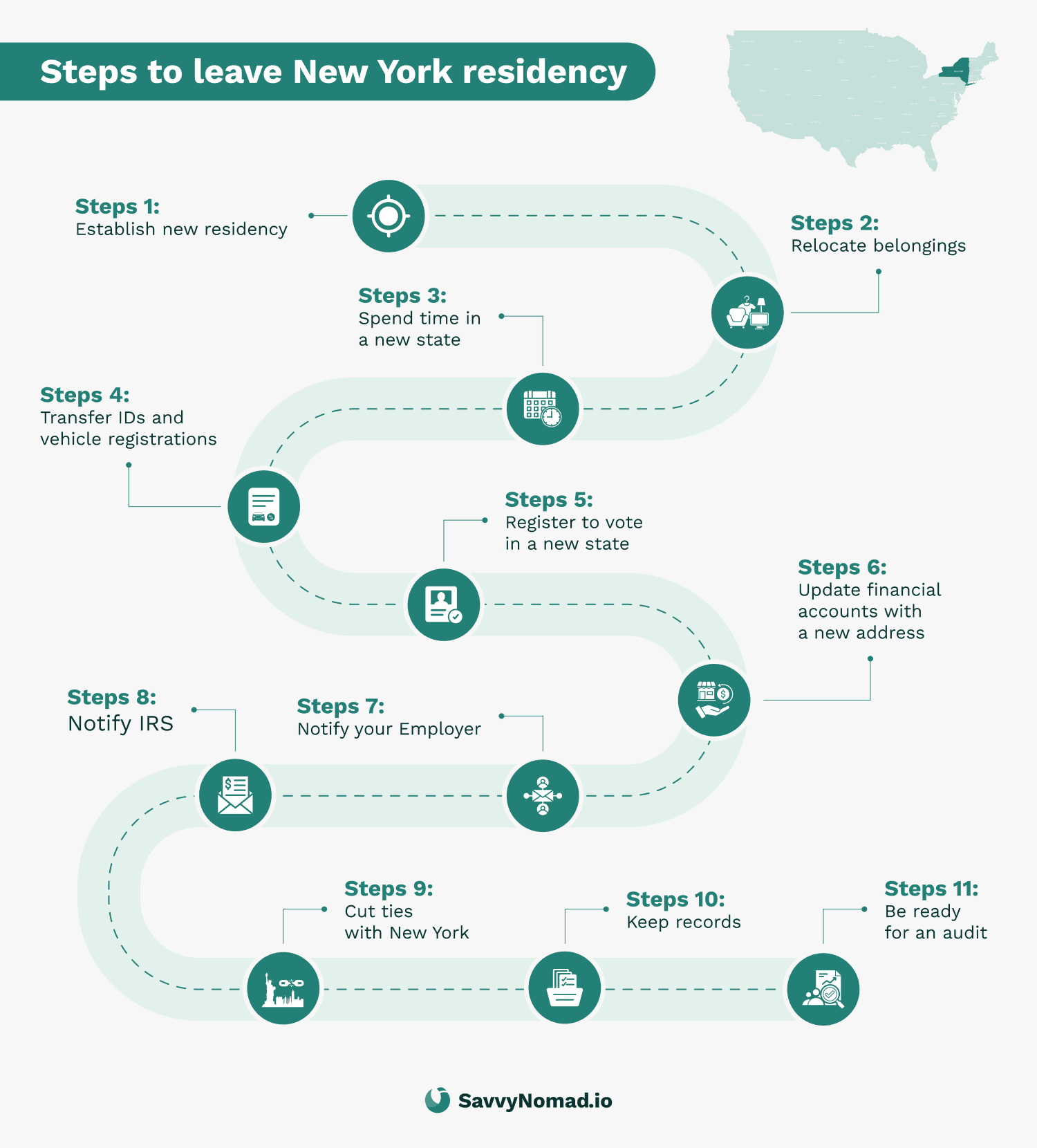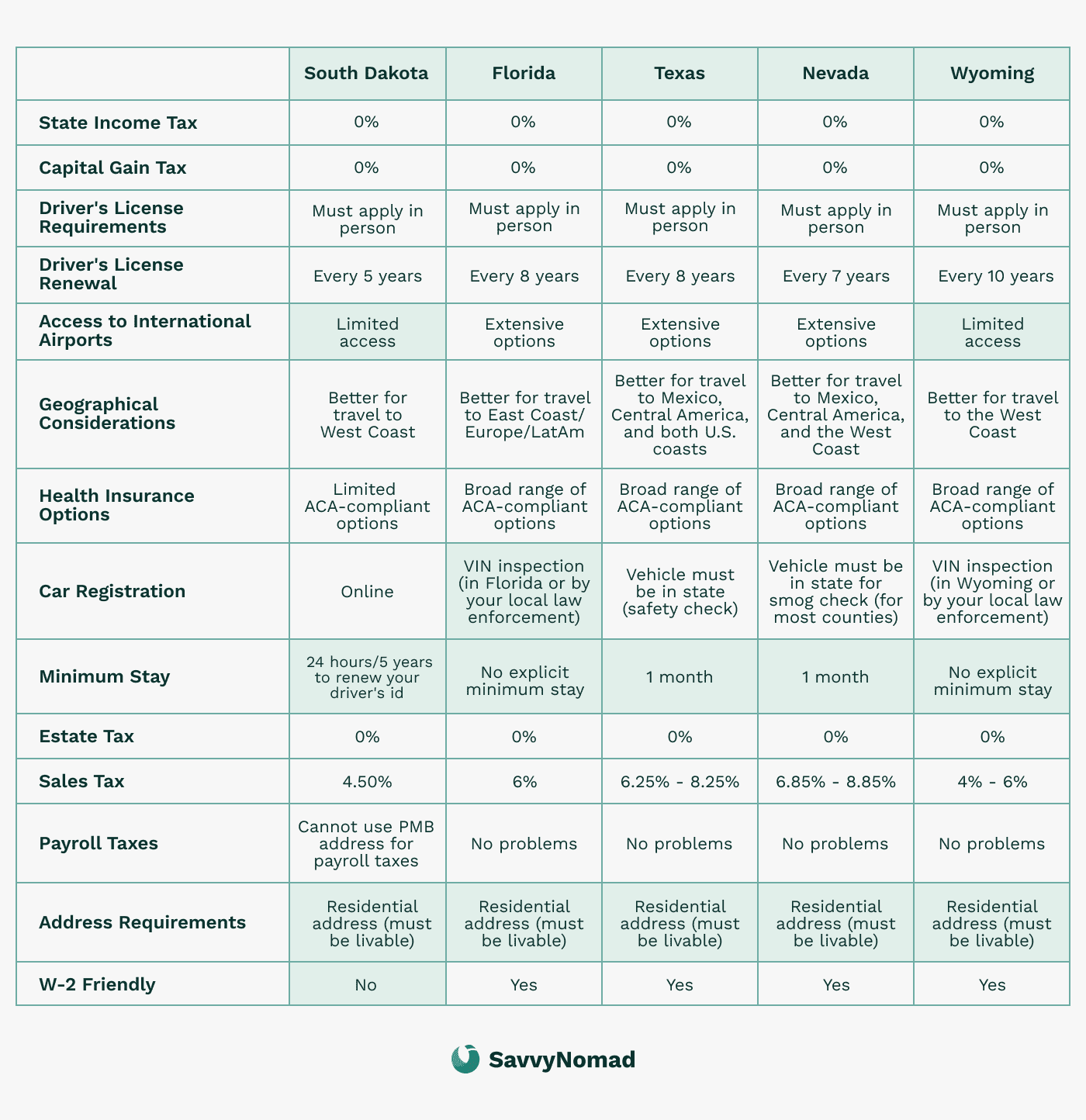Must Expats from New York Continue to Pay State Taxes?

New York’s nuanced tax laws make navigating state taxes complex for New York expats. Understanding residency status and tax obligations can have big consequences because New York's tax liabilities can extend globally while you may be living abroad.
Compliance with New York’s domicile rules and laws is necessary to avoid unexpected legal and financial consequences (remember, ignorance of the law is no excuse for breaking it!). This knowledge helps you adhere to the law and assists expatriates living their best lives abroad in efficient financial planning.
TLDR:
If you haven't established a new domicile in another state, you may still be considered a New York resident for tax purposes (even if you haven’t been there all year).
Understanding your residency status in NY
In New York State, your residency status significantly influences your tax obligations. There are three main residency statuses: resident, nonresident, and part-year resident. Each status has its own distinct criteria and tax implications.
Resident
You're considered a resident if New York is your domicile, meaning it's your permanent home—the place you intend to return to after absences. Additionally, if you maintain a dwelling in New York for more than 11 months and spend at least 183 days in the state within the tax year, you're deemed a resident. Residents are taxed on their worldwide income, regardless of where (and how) it's earned.
Nonresident
Nonresidents are those who do not meet the criteria to be considered residents. You might work in New York or earn income from New York sources but live elsewhere, like New Jersey or Connecticut, as common examples.
Nonresidents are taxed only on income earned from New York sources, such as wages for work performed in New York or income from property located in New York.
Part-year resident
If you move to or from New York during the tax year, you might be classified as a part-year resident. This status applies if you change your permanent home from New York to another location or vice versa.
Part-year residents are taxed on all income received, while a resident and New York-source income is received only during the portion of the year they were nonresidents.
For those who moved abroad
If New York was your last state of residency before moving abroad, you might still have tax filing obligations to consider, even if you no longer live there. New York employs a " domicile " concept to determine tax residency, which is more complicated than where you spend your time.
If New York was your domicile and you haven't established a new one in another state or country, you may still be considered a New York resident for tax purposes, meaning you are subject to New York taxes.
What constitutes New York-sourced income?
New York-sourced income includes, but is not limited to:
- Wages and Salaries: Money earned for services performed in New York State, regardless of where your employer is based or where you reside.
- Capital Gains: Profits from the sale of real estate or tangible property located in New York State.
- Business Income: Income from business activities conducted in New York State, including partnerships and sole proprietorships.
- Real Estate: Rental income from property located within New York State.
Why should you move domicile to a state with zero state income tax?
State income tax savings
For retirees and high-income individuals living in New York, moving to states without income taxes, such as Florida, Texas, or Nevada, can offer significant financial advantages. Without the burden of state income taxes, you can keep more of your earnings, allowing for greater investment opportunities or an enhanced lifestyle.
Inheritance tax benefits
States like Florida and Texas lack a state income tax and do not impose state estate taxes. This can considerably reduce the tax burden on your estate, ensuring that more wealth is passed on to your heirs. This is especially advantageous for individuals with substantial assets who wish to maximize the amount left to their beneficiaries.
Flexibility and mobility
Relocating your domicile to a no-income-tax state enhances your flexibility and mobility, allowing you to travel and live in various locations without worrying about high state tax bills.
This is ideal for high-income earners with business interests in multiple states or countries and for retirees who desire to spend their later years exploring new places.
Moreover, the lack of state income taxes simplifies your tax filing process. You must file only federal taxes, reducing the complexity and potential for errors in your tax returns and making financial management more straightforward.

Leaving New York state tax residency (in 11 easy steps)

Changing your New York State residency involves several calculated steps to ensure a clear-cut transition.
1) Establish new residency
Secure a residential address in the new state. If you buy a home, you may want to look into available tax credits, such as Florida’s homestead exemption. You may want to consider filing a Declaration of Domicile with the state, as suggested in Savvy Nomad’s domicile guides.

2) Transfer IDs and registrations
Promptly update your driver's license and vehicle registration as soon as you are eligible.
3) Register to vote
Register to vote, and vote, in your new state, if possible.
4) Update documents
Ensure that all identification, medical, insurance and financial documents reflect your new address.
5) Notify your employer
It’s important to notify your employer of your residency change. This can also help convert some of your income from being “New York-sourced” if your employer recognizes that the work you complete is no longer done within NY state lines.
6) Notify IRS
Inform the IRS of your address change using Form 8822. Extend this notification to all personal and professional entities and, as soon as possible, engage professionals in your new state of domicile.
7) Keep records
Document all relocation actions diligently. Maintain records of flights, short- and long-term rentals, and travel dates. In the event of an audit, the burden of proof falls on the taxpayer to prove they are no longer a taxable resident of New York.
8) Acknowledge key factors
New York considers multiple factors for domicile status, including home, time spent within the state, business ties, location of valuables, and family location. Make sure you feel confident of as many of these as you can.
9) Anticipate an audit
Be audit-ready with comprehensive proof that your move to another state is permanent.
Tax benefits and exemptions for expats from New York
Living abroad as an expat comes with various federal tax benefits and exemptions that can help reduce your overall tax burden.
Here are some of the key federal tax advantages available:
Foreign Earned Income Exclusion
The FEIE allows U.S. taxpayers living abroad to exclude a certain amount of their foreign-earned income from U.S. federal income tax.
For the tax year 2024, this exclusion amount is up to $126,500.
To qualify, you must pass either:
• Bona Fide Residency Test: You qualify if you are a resident of a foreign country for an uninterrupted period that includes an entire tax year.
• Physical Presence Test: You qualify if you are physically present in a foreign country for at least 330 full days during a 12-month period.
Foreign Tax Credit
The foreign tax credit (FTC) helps you avoid double taxation by allowing you to credit foreign taxes paid against the U.S. federal taxes due on income that is also subject to U.S. federal tax.
This credit can significantly reduce your U.S. tax liability, especially if you reside in a country with high tax rates.
Foreign Housing Exclusion (FHE)
Although its name uses the word “exclusion,” the FHE actually allows you to deduct certain housing expenses from your federal taxable income, including rent, utilities (excluding telephone), and other reasonable expenses related to housing abroad.
The amount you can deduct is limited to a base amount plus housing expenses exceeding 16% of the FEIE limit.

Filing New York state taxes from abroad
Filing New York State Taxes from abroad involves several important steps to ensure compliance and avoid penalties.
Here's a streamlined approach:
1. Determine your residency status
First, establish whether you're considered a resident, nonresident, or part-year resident for the tax year. This status significantly influences your tax filing obligations.
2. Identify New York-sourced income
If you have income from New York sources—such as wages for work performed in the state, income from business operations conducted in New York, rental income from New York properties, or capital gains from the sale of property in New York—you may need to file.
3. Understand filing requirements
For Residents: If you were a resident of New York and are required to file a federal return, you likely will need to file a state return as well.
For Nonresidents: You must file Form IT-203 if your New York-sourced income exceeds your New York standard deduction or if you wish to claim a refund of New York State, New York City, or Yonkers income taxes withheld from your pay.
Additional filing requirements apply if you want to claim certain refundable or carryover credits or had a net operating loss for New York State personal income tax purposes.
4. Filing deadlines and forms
The typical deadline for filing New York State taxes is April 15. Expats are granted an automatic two-month extension, pushing back their deadline into June. Nonresidents and part-year residents should use Form IT-203, Nonresident and Part-Year Resident Income Tax Return.
5. Digital filing options
New York State offers e-filing services, which simplify the process for expatriates. These digital platforms guide you through filing, ensuring you satisfy New York State's requirements.
Penalties for non-compliance with New York state tax laws
Failing to adhere to New York State's tax obligations carries serious implications for both expatriates and former residents. The consequences of such non-compliance highlight the critical importance of maintaining tax obligations.
Implications of failing to meet state tax obligations
Non-compliance can lead to various penalties that underscore the necessity of staying informed and compliant with New York tax laws:
Fines and penalties
Neglecting to file or pay taxes on time can result in substantial fines. These penalties increase with the length of the delay, adding a significant financial burden to the taxes owed.
- Late filing and payment penalties: Failure to file or pay taxes by the deadline without reasonable cause incurs penalties. The penalties, which accumulate daily, are calculated based on the unpaid tax and the length of the delay.
- Underpayment penalty: Taxpayers who underreport their income face penalties and interest on the amount underpaid, which can significantly increase their tax liability.
Interest charges
Beyond fines, unpaid taxes accrue interest daily, further increasing the amount owed to the state.
Legal sanctions
In severe cases, such as tax evasion, the repercussions can extend beyond financial penalties to include legal action and possible criminal penalties.
Options for resolving tax issues
Recognizing the challenges that come with tax compliance, New York State provides mechanisms for taxpayers to address and resolve tax issues:
- Voluntary disclosure program: This initiative allows individuals who have failed to file or underreported their taxes to correct their tax affairs voluntarily. By making voluntary disclosure, participants can avoid criminal prosecution and may qualify for reduced penalties.
- Offer in compromise: Under certain conditions, taxpayers demonstrating financial hardship may be able to settle their tax debts for less than the full amount owed.
- Payment plans: For those unable to pay their tax debt in full, the state may offer payment plan options, facilitating manageable payments over an extended period.
FAQ
What triggers the NY residency audit?
New York residency audits can be triggered by high income, a change in domicile or statutory residency or, for many people, moving out of the state. Audits often begin with a questionnaire requesting proof of address.
Does New York have an exit tax?
No, New York has no official exit tax for residents leaving the state. However, residents who move out of New York during the tax year are generally required to file a part-year resident tax return and pay income taxes on any income earned while residing in New York.
Does New York have a 183-day rule?
Yes, New York does have a 183-day rule for determining residency for tax purposes. According to the rule, individuals may be considered residents if they spend 183 days or more in the state during the tax year.
What is the residency test in NYC?
The New York City residency test involves two main criteria: the Domicile Test and the Statutory Residency Test. Under the Domicile Test, an individual is considered a New York City resident for tax purposes if they are domiciled in New York City or maintain a permanent place of abode there and spend more than 183 days there.
On the other hand, the Statutory Residency Test deems an individual a resident if they maintain a permanent place of abode in the city for substantially all year and spend more than 183 days in New York City.
Can you leave residency and come back?
In a word, yes. Leaving New York residency and returning involves documenting your break from residency via a tax return, specifically Form IT-203, as a part-year resident.
The state considers several factors to determine residency, including domicile status, maintaining a permanent place of abode, and presence in the state for more than 183 days.
To reestablish residency, you would need to demonstrate a permanent move back to New York, considering factors like the location of your home, family, business, time spent in each state, and where you keep important possessions.





